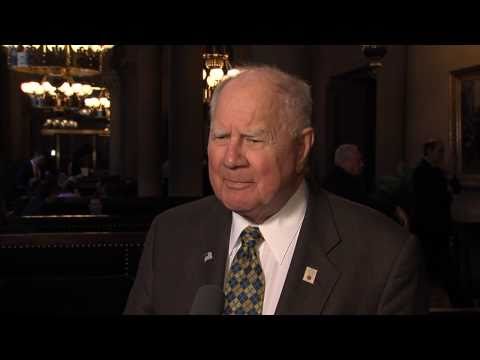
Senator Larkin: "Planting Seeds" Initiative Will Strengthen Region's Agricultural Industry, Grow Jobs
February 9, 2016

Senator Bill Larkin (R,C-39th District) is urging the enactment of the Senate Majority’s 2016 “Planting Seeds” legislative initiative to boost farming and the state’s diverse and growing agricultural sector.
“Planting Seeds is a comprehensive package of legislative initiatives that will boost the state’s farming, agri-tourism and other agricultural industries, while helping to ensure an abundance of farm fresh and safe products reach New Yorkers’ dinner plates,” said Senator Larkin. “Providing additional support to these industries will help promote a strong and robust agricultural economy here in the Hudson Valley and throughout New York State.”
Senator Larkin, an outspoken advocate for New York’s veterans, praised the plan’s veteran component, which would create a first-in-the-nation pilot program run by Cornell’s Small Farms Program to help establish up to five veteran-owned small farms. Under the program, returning veterans and those seeking a career change could be encouraged to try agriculture, utilizing benefits they’ve earned under the GI Bill to gain training and expertise to begin their own successful small business. In turn, these sites would be available to train additional veteran-farmers in future years.
“I am very excited about the veterans’ assistance component of this bill,” said Sen. Larkin. “Servicemen and women returning home from deployment face many challenges and often face a difficult time transitioning back into civilian life. I believe this is an extremely worthwhile program that may help make this transition easier—while opening up a great opportunity for veterans.”
Senator Larkin noted that the Senate’s new Planting Seeds initiatives would: provide research, education, and marketing assistance; create new tax and regulatory relief; advance initiatives to expand markets, promote quality, and increase food safety; and create job opportunities for veterans and others interested in farming.
Planting Seeds initiatives include:
Restoring Funding Cuts
· Since 2011, Senate Republicans have succeeded in restoring more than $32 million in budget cuts for agriculture funding. The 2016-17 Executive Budget proposes to cut funding for 42 different programs in the largest single-year reduction in agriculture funding in five years. Senate Republicans will prioritize full restoration of these cuts, and work to achieve record levels of funding to support family farmers.
Strengthening Farmers’ Bottom Lines
· Estate Tax Reform – speed up the full phase-in of the estate tax reform enacted in 2014 as part of the Senate’s Young Farmers initiative to allow farmers to claim the federal exclusion amount; and
· Farmer Personal Income Tax (PIT) Exemption – reduce taxes on family farmers by raising the PIT exemption for small and mid-sized family farms from the current 5 percent to 20 percent, and making even more farmers eligible for the exemption.
Supporting Research
· Restore cuts to Cornell University’s important agriculture-related research and study programs to keep it as the nation’s premier center for agricultural learning and research; and
· Increase state funding for Cornell’s College of Agriculture and Life Sciences to meet the growing demand from students for agriculture and veterinary instruction programs. Increasing support for these education programs will help hold the line on rising college costs and student debt.
Protecting Food and Human Health
· Support programs that aim to detect and prevent the spread of diseases in plants and animals. Senate Republicans will seek to increase funding for cutting edge research into the prevention and spread of avian disease (“bird flu”), and recently arrived threats to food safety such as Salmonella Dublin, a virus that affects dairy cows and has sickened humans who drink raw milk. Additional funding would expand Cornell’s research into the recent honeybee die-off, which is critical to crop pollination, and expand programs that encourage farmers to reduce pesticide use;
· Support the replacement of aging and outdated lab facilities. State funds would help leverage additional USDA support for a new lab to continue Cornell’s cutting-edge food safety and research programs; and
· Increase funding to efforts that stop the spread of wildlife rabies from Canada and across New York State, and to provide reimbursement to local public health services for costly human post-exposure rabies preventive treatments.
Encouraging Innovation
· Restore budget funding for a third round of Beginning Farmer grants, created as part of the Senate’s 2014 Young Farmers initiative to encourage interest in agriculture and help protect the future of family farming. Already, nearly two dozen farms from across the state are benefitting from the first round of $15,000 -$50,000 grants to help young farmers purchase seed, equipment and supplies. A second round of grants will be announced in the near future to help even more new businesses grow;
· Provide new funding for established farmers to help them install innovative new technology to make their farms more efficient and profitable;
· Increase funding for local cooperative extensions, which are often the first point of contact for experienced and beginning farmers in finding solutions to problems and challenges on the farm;
· Increase investment in FarmNet, which provides services and assistance to farmers, including business and farm transition planning; and
· Help dairy farmers who are dealing with price volatility by increasing funding for programs that help find ways to improve profits.
Supporting Agriculture Education
· Extend the Beginning Farmer Student Loan Forgiveness Program to include students who are pursuing degrees in agriculture education. The program was a part of the Senate’s 2014 Young Farmers initiative to provide loan forgiveness for beginning farmers to encourage more young people to consider careers in agriculture;
· Continued support for the high-school based Future Farmers of America (FFA) programs;
· Create a new North Country Ag Academy. Modeled on a similar program in Western New York, the Ag Academy would provide hands-on learning experiences for aspiring young farmers to learn and practice the agricultural arts, and prepare them for future careers; and
· Establish an agriculture management program at SUNY’s Canton College, which can serve as a lower-cost alternative to four-year agriculture degree programs. Originally founded as the School of Agriculture at St. Lawrence, the college eliminated most agriculture-related degrees in the 1990s. The Senate would support the provision of staff to provide courses and real work experience, allowing students to study marketing, technology, and other practical skills necessary to survive and thrive in the farming industry.
“The Senate’s Planting Seeds program contains a number of worthwhile proposals and I look forward to working with my colleagues on both sides of the aisle to pass these important pro-farming initiatives,” concluded Larkin.
Share this Article or Press Release
Newsroom
Go to NewsroomStudents Inside Albany Shadow
May 19, 2011

Military Voting
May 18, 2011

Legislative Redistricting
May 18, 2011

